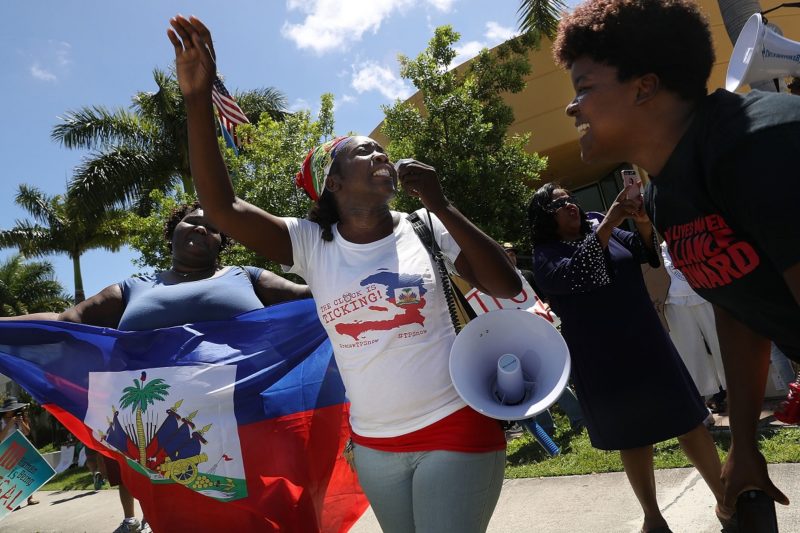Trump’s Anti-Immigration Agenda Puts 60,000 Haitians in Peril
“On the eve of Thanksgiving, the administration has decided to contravene basic humanitarianism in favor of an immigration agenda that is drenched in racism, nativism, and xenophobia."

Acting Department of Homeland Security (DHS) Secretary Elaine Duke announced Monday she will uphold former DHS secretary John Kelly’s decision to terminate Temporary Protected Status (TPS) for the nearly 60,000 Haitian immigrants residing in the United States.
“The decision to terminate TPS for Haiti was made after a review of the conditions upon which the country’s original designation were based and whether those extraordinary but temporary conditions prevented Haiti from adequately handling the return of their nationals, as required by statute,” according to a statement from DHS. “Based on all available information, including recommendations received as part of an inter-agency consultation process, Acting Secretary Duke determined that those extraordinary but temporary conditions caused by the 2010 earthquake no longer exist. Thus, under the applicable statute, the current TPS designation must be terminated.”
Haitian immigrants were first given TPS in 2010 by the Obama administration after one of the region’s most destructive earthquakes affected an estimated 3 million people and killed more than 200,000. The administration last year renewed the extension after Hurricane Matthew, which decimated the southern region of the nation, killing 1,000 people, leaving a cholera outbreak in its wake, and halting reconstruction work ongoing after the earthquake. While Hurricane Irma largely skirted Haiti this year, it hit southern Florida hardest, which is home to thousands of Haitian TPS recipients.
Advocates in May were requesting an 18-month extension for TPS for Haiti, but then-DHS Secretary Kelly granted a six-month extension. Advocates expressed concern that Kelly may have based his decision on information unrelated to conditions in Haiti.
The Associated Press reported that a Trump administration official was digging for “unorthodox” information on Haitian TPS recipients as DHS considered the extension: crime data and information related to public benefits. The AP obtained internal emails in which a “top immigration official wanted not only crime data on Haitians who are protected from deportation under the Temporary Protected Status program, but also how many were receiving public benefits. Such immigrants aren’t eligible for welfare benefits.”
Kelly has since shifted roles, now acting as White House chief of staff, but it appears as if he still wields power over DHS. Duke this month terminated TPS for Nicaragua and because she failed to make a decision for Honduras, TPS was automatically extended for six more months. Duke originally planned to extend TPS for Honduras, but was pressured by Kelly to expel them, according to the Washington Post.
Duke’s decision will devastate Haitian communities in the United States and Haiti. Haiti, the poorest country in the western hemisphere, is still recovering from the earthquake, despite claims from DHS that “significant steps have been taken to improve… stability” in Haiti. The country heavily relies on money its expatriates send home. Haitian TPS recipients are expected to leave the United States by July 2019 or face detainment and deportation.
DHS’s ending of TPS for Haiti, Sudan, and Nicaragua signal to advocates that the Trump administration is moving to terminate the TPS program entirely, a move immigration advocates call “wrong and immoral.”
First signed into law by President George H.W. Bush in 1990, more than 320,000 people benefit from TPS, including nearly 200,000 people from El Salvador. El Salvador’s designation expires in March 2018. Should DHS fail to extend TPS for both El Salvador and Honduras, it would subject 260,000 immigrants—who come from two of the three countries that make up what has been referred to as “Central America’s triangle of death”—to deportation.
The Black Alliance for Just Immigration (BAJI) called DHS officials’ decision regarding Haitian TPS recipients “inhumane.”
“DHS refuses to acknowledge the compounded impact of several environmental disasters along with an ongoing cholera epidemic on the recovery process in Haiti. In the midst of rebuilding and revitalizing its overall infrastructure, large influxes of nationals will disrupt and negatively impact the nation’s path towards recovery,” Opal Tometi, BAJI’s executive director and co-founder of the Black Lives Matter Global Network, said in a statement. “On the eve of Thanksgiving, the administration has decided to contravene basic humanitarianism in favor of an immigration agenda that is drenched in racism, nativism, and xenophobia.”
